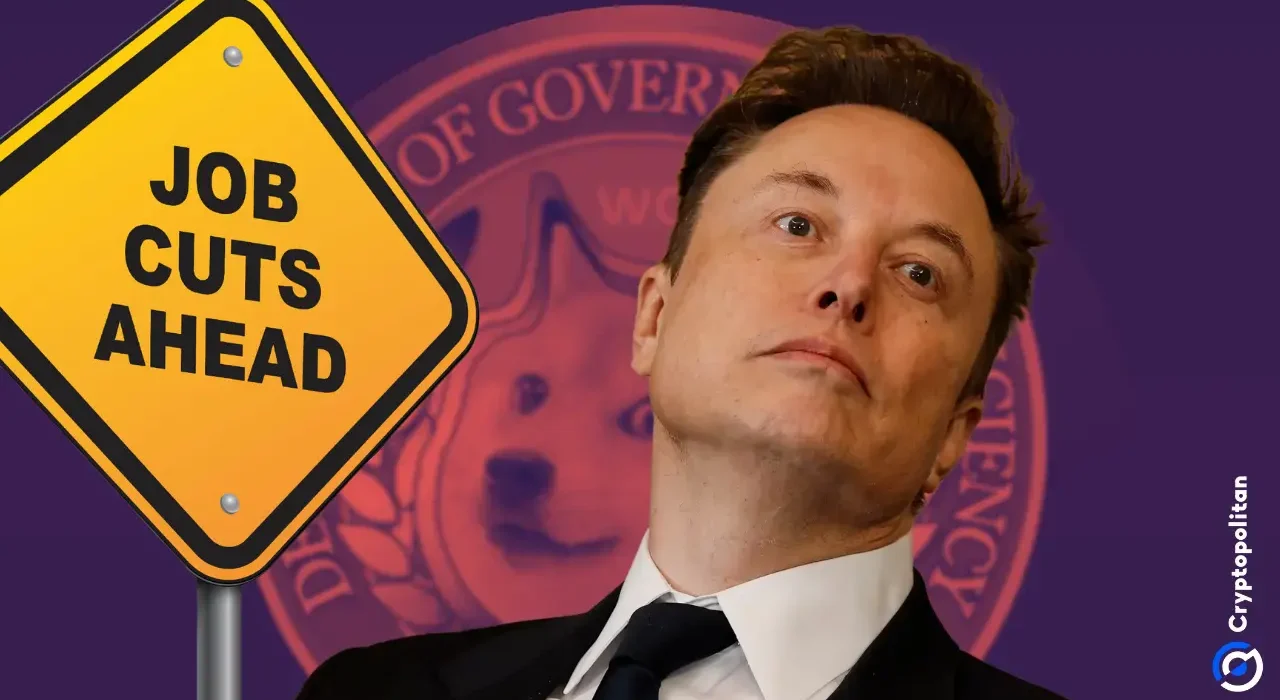According to prediction markets, Kalshi forecasts that the Department of Government Efficiency (DOGE) will cut 317,000 government employees in 2025. The agency has already fired thousands of government employees and offered others deferred resignation proposals.
Kalshi forecasts revealed that prediction markets now expected the Department of Government Efficiency (DOGE) to cut over 30,000 government jobs in 2025. Kobeissi’s letter highlighted that this was a 107,000 increment from data recorded nine days ago.
Prediction markets see DOGE making more job cuts in 2025
The Department of Government Efficiency, led by Elon Musk, pledged to reduce government spending once Trump assumed power as the president of the United States. The department revealed it would streamline government operations by reducing redundancy and optimizing the federal workforce.
BREAKING: Prediction markets now see DOGE cutting 317,000 government employees in 2025, per @Kalshi.
This is up sharply from the 200,000 in expected job cuts seen just 9 days ago. https://t.co/vtk36HsWoU pic.twitter.com/DXsjBLwNbd
— The Kobeissi Letter (@KobeissiLetter) February 19, 2025
Health agencies that are part of the Department of Health and Human Services reported layoffs. Other agencies that have already experienced layoffs include the Centers for Disease Control and Prevention(CDC) and the Centers for Medicare and Medicaid Services(CMS).
The White House offered deferred resignation proposals to federal workers earlier this month in exchange for financial initiatives. The Office of Personnel Management announced on February 12 that 75,000 federal employees had already accepted the offer.
Probationary employees have reportedly experienced layoffs since Trump took over the Oval Office. On February 13, the Trump administration ordered federal agencies to lay off such workers. Government data revealed that 220,000 federal employees fell under the category as of March 2024.
The Department of Veterans also reported the dismissal of over 1000 staff members who had been in the agency for less than two years. Sen Patty Murray commented the laid-off workers included researchers at the cancer treatment department, opioid addiction, and prosthetics.
A union representing agency workers revealed that over 40 people were fired from the education department. The union also reported approximately $900 million in budgetary cuts to the educational services institute.
Other agencies that reported layoffs include the National Park Service, Internal Revenue Service, Department of Homeland Security, and the Energy Department.
Musk turns to prediction markets to access policy effects
Tarek Mansour, CEO at Kalshi, commented that Elon Musk was increasingly turning to Kalshi’s forecasts to track DOGE’s progress. The CEO suggested that the US government was using Kalshi to inform policy.
Mansour revealed that prediction markets’ mission was to enlighten people before making decisions that would affect their future. The CEO emphasized the concept did not only apply to businesses but could also apply to governments. He quoted Robin Hanson’s concept of Futarchy, which states that governments use prediction markets to evaluate which policies are likely to have more positive effects.
Mansour predicted that Elon’s use of Kalshi to determine policy success could push other government agencies to use the prediction markets when tracking their policy goals.
According to Treasury Secretary Scott Bessent, DOGE saved the United States government over $50 billion. Musk also suggested that the total amount could reach over $2 trillion over time.
James Fishback, CEO of the investment firm Azoria, commented on Elon’s predictions and suggested that the government should announce a “DOGE dividend.” He added that all United States citizens should receive a $5000 tax refund from the government after DOGE achieved its targets. Under his plan, citizens would receive 20% of DOGE’s profits as direct payments in cheques. Musk responded to the suggestion by stating he would discuss the issue with Trump.
Musk has not explained how he would achieve the $2 trillion in cuts. Congressional Republicans also proposed a tax package projected to add more than $4 trillion to the deficit. Jessica Riedl, a senior fellow at the Manhattan Institute, highlighted that DOGE had reduced government spending by approximately $4 billion.
She added that given the small share of federal spending that has been deducted and a budget deficit of $2 trillion, it was unlikely that any savings from DOGE’s cuts would be directed to a tax rebate but would instead go to the deficit reduction.
Cryptopolitan Academy: FREE Web3 Resume Cheat Sheet – Download Now
